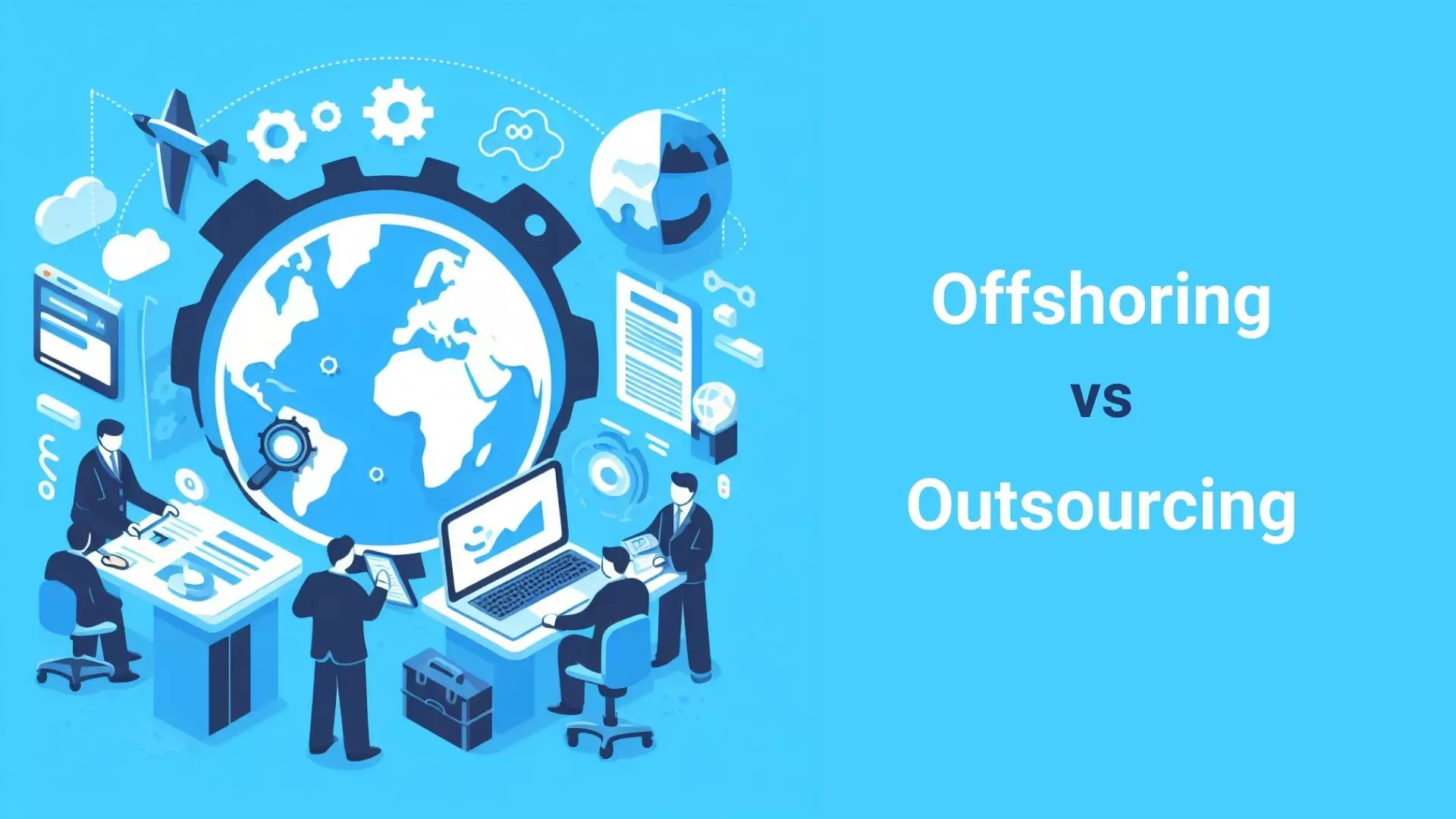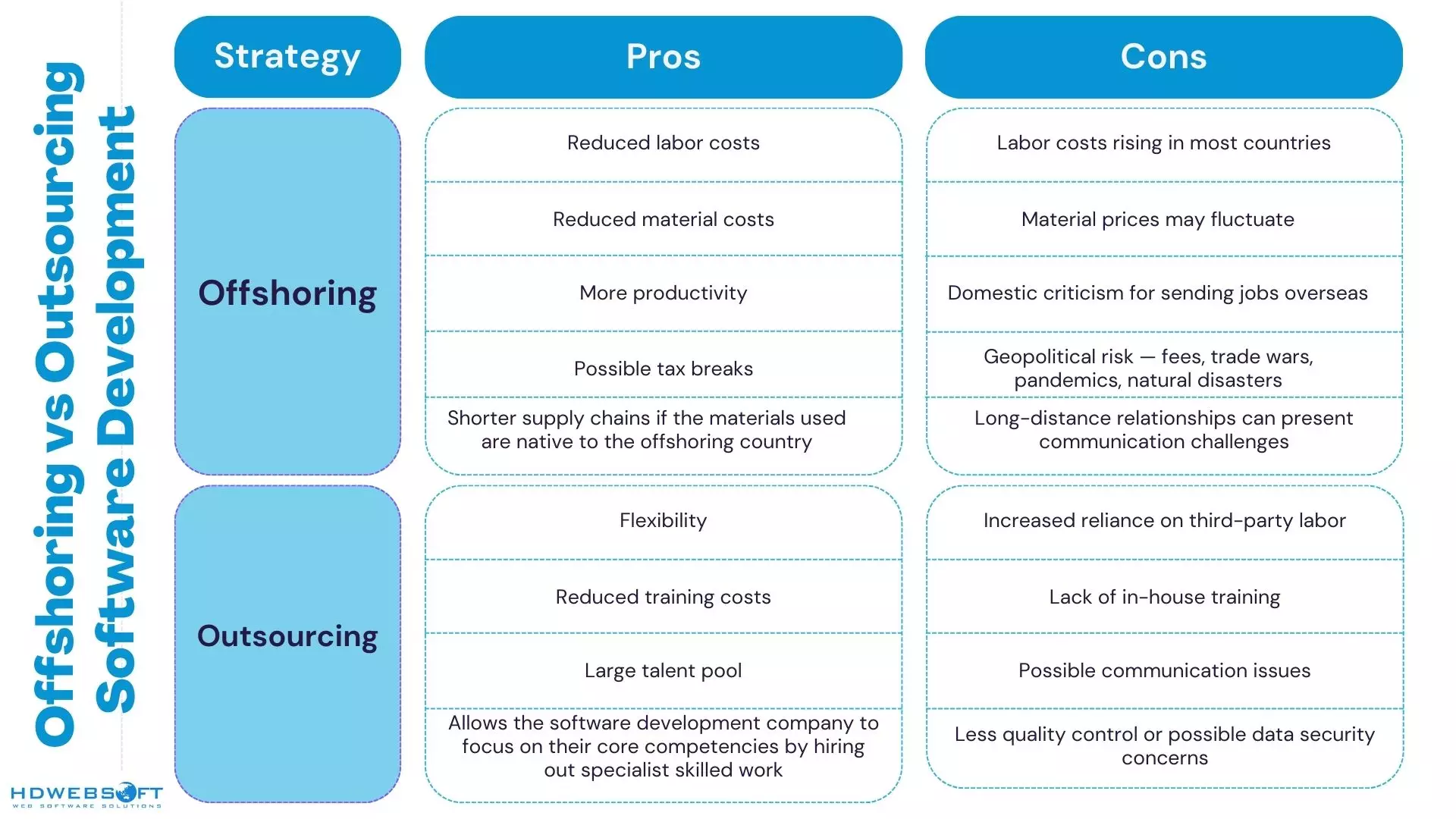
Offshoring vs Outsourcing: Are They Different?
Offshoring and outsourcing are often confused businesses. Offshoring refers to getting work done in a different country, usually to leverage cost advantages. For example, a U.S. technology company opens a software development center in India to use lower-cost labor and local technical talent, handling projects directly under the company’s global umbrella.
On the other hand, outsourcing is an organization contracting work out to a 3rd party or independent contractors. For example, hiring an outside law firm to review contracts instead of maintaining an in-house staff of lawyers. This is outsourcing.
In short, offshoring and outsourcing is the practice of hiring a vendor to do the work, usually to lower costs and take advantage of the vendor’s expertise, economies of scale, and large and scalable labor pool.
In fact, 83% of IT leaders are considering outsourcing their security efforts due to various challenges such as budget cuts and increased cyber threats.
In this article, we will dig into the definition of offshoring and outsourcing, and the difference between them in 2024.
- 1) What is Offshoring?
- 2) What is Outsourcing?
- 3) The Differences Between Offshoring and Outsourcing in Software Development
- 4) Offshoring And Outsourcing Comparison
- 5) The Pros and Cons Between Offshoring And Outsourcing
- 6) Risks and Criticism of Offshoring and Outsourcing Software Development
- 7) Conclusion
What is Offshoring?

Offshoring is the process of relocating some of your software development operations to another country. This approach enables businesses to capitalize on cost savings, tap into more favorable labor markets, and enjoy other advantages offered by partner countries.
For instance, a software development company based in the United States may opt to offshore certain operations to Vietnam, where labor costs are comparatively lower.
Therefore, choosing to engage in offshore software development offers a beneficial chance to reduce costs and improve efficiency.
However, it also does come with certain risks. For example, language differences, cultural variations, and different time zones can create communication challenges between the company and its offshore partner. Additionally, businesses need to consider legal and regulatory issues when forming partnerships with offshore software companies.
Learn more: Top 5 Hiring Tips For Offshore Software Developers
There are 3 outsourcing models that businesses often consider including:
- Project-Based Model: Hire a freelancer or team to do the planned and defined project
- Dedicated Team Model: Hire a freelancer or team to create a project and will work only on that project
- Outstaff Model: Hire a freelancer or team to do the specific scope of work
What is Outsourcing?

Outsourcing is hiring an external company to handle specific tasks or functions within a software development project. This can encompass various stages of the development process, such as design, testing, and maintenance. An example of this would be a software development company outsourcing its quality assurance to a third-party testing company.
Outsourcing software development is a strategic approach that can lead to cost savings and increased productivity.
According to research by Deloitte, 70% of companies choose to outsource software development projects for cost reduction.
Businesses can focus on their core values and enhance their performance by delegating non-essential tasks to external partners.
However, it’s important to acknowledge that outsourcing also comes with certain risks. Factors such as quality control, communication issues, and other challenges can impact the effectiveness of the outsourcing process.
Learn more: How To Choose The Right Software Outsourcing Company
There are four offshore models that businesses often consider including:
- Freelance: by hiring freelancers
- Functional: offshore to other company
- Dedicated: build your own team but operate offshore
- Own office: set up your offshore team by selecting every member and working like an office offshore
The Differences Between Offshoring and Outsourcing in Software Development

The primary difference between offshoring and outsourcing in software development lies in the location of the work. Offshoring software development entails relocating certain operations to another country.
In contrast, outsourcing software development is contracting a third-party company to carry out a specific task or function within the same country, potentially even in the local or in an entirely different region.
Another aspect is the level of control that your company maintains over the work. To be specific, when you offshore your software development, you have greater control over the development process. You can establish your own office, hire your own employees, and directly manage the work.
On the other hand, when you outsource your software development operations, you are dependent on a third-party company to perform the work. This means you have less control over the quality of the work process compared to offshore services.
Offshoring And Outsourcing Comparison
We also create a detailed table of offshoring vs outsourcing comparison:
| Offshoring | Outsourcing | |
|---|---|---|
| Definition | Offshoring means getting work done in a different country. | Outsourcing refers to contracting work out to an external organization. |
| Risks and criticism | Offshoring is often criticized for transferring jobs to other countries. Other risks include geopolitical risks, language differences and poor communication etc. | Risks of outsourcing include misaligned interests of clients and vendors, increased reliance on third parties, lack of in-house knowledge of critical (though not necessarily core) business operations etc. |
| Benefits | The benefits of offshoring are usually lower costs, better availability of skilled people, and getting work done faster through a global talent pool. | Usually companies outsource to take advantage of specialized skills, cost efficiencies and labor flexibility. |
The Pros and Cons Between Offshoring And Outsourcing
We also do a comparison between the pros and cons of both offshoring and outsourcing software development:

The Benefits Of Offshoring Software Development
Offshore software development provides many of the same benefits as outsourcing, including:
- Cost savings: Companies usually offshore manufacturing or services to developing countries where wages are low, thus resulting in cost savings. These companies pass on these savings to their customers, shareholders, and managers.
- Skills: The competitive advantage of nations often means that some countries or regions develop a much better ecosystem for certain types of industries. This means there is better availability of skilled human resources in that region for specific types of tasks.
Note: You do not need to outsource in order to offshore. Companies set up captive offshore units to leverage the benefits of offshoring without relying on outsourcing to vendors. They typically do this when they believe that their offshore centers for production or services will provide them with a competitive edge.
The Benefits Of Outsourcing Software Development

Why do companies outsource?
There are several reasons why a company might outsource. While this can be a politically sensitive topic, management experts generally agree that outsourcing – when done right – increases competitive advantage with a natural division of labor that evolves in any society.
Reasons for outsourcing include:
- Labor flexibility: Outsourcing allows a company to ramp up and down quickly as needed.
- Cost advantage: Companies may find it cheaper to contract work out to a third party instead of doing it themselves.
- Focus on core competency: Allow the company to gain a competitive advantage over its competitors without being distracted by other business functions.
- Quality and Capability: Provide and ensure high-quality products and services for companies that lack in-house expertise.
Risks and Criticism of Offshoring and Outsourcing Software Development

Offshoring and outsourcing have both been subject to a lot of criticism, especially from a political standpoint. Politicians and laid-off workers often blame offshoring for “stealing jobs”.
However, most economists agree that offshoring lowers costs for companies and passes on benefits to consumers and shareholders.
On the other hand, there are some risks associated with offshoring including:
- Project failure due to poor communication
- Civil or political unrest impacting production or service delivery
- Decision changes in government economic policy may force unnecessary restrictions on MNCs
- Poor infrastructure in the developing country may affect quality or timeliness.
While the benefits of outsourcing and offshoring largely overlap, they do not face the same disadvantages. Outsourcing, when done within the country, does not face the same political criticism of loss of jobs. Risks associated with outsourcing can largely be attributed to the vendor’s lack of familiarity with the client’s business. Another risk is a lack of alignment between the client’s and vendor’s long-term business objectives.
Conclusion
Offshoring and outsourcing are two distinct business strategies that can offer substantial advantages to your software development company. However, it is crucial to recognize that they are not interchangeable.
By comprehending the disparities between offshoring and outsourcing in software development, you can make an educated decision regarding the most suitable approach for your software development project.
In short, your company’s growth relieson choosing the right model and offshore or outsource partner for your needs, whether it’s short-term or long-term. It depends on how your company chooses a reliable and reputable partner that meets your specific requirements.









